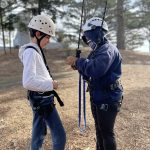 It is May 12, 2015. 31 years ago, Chad Laflamme was born blue-eyed in Gorham, New Hampshire. Today, he has a bushy red beard and is taller than me, even when sitting. His presence is quietly powerful, sitting on a plastic chair in the shaded light of the office on the Midpines base. Outside it is hot and cars zoom by on the nearby Highway 140, on their way to Yosemite.
It is May 12, 2015. 31 years ago, Chad Laflamme was born blue-eyed in Gorham, New Hampshire. Today, he has a bushy red beard and is taller than me, even when sitting. His presence is quietly powerful, sitting on a plastic chair in the shaded light of the office on the Midpines base. Outside it is hot and cars zoom by on the nearby Highway 140, on their way to Yosemite.
Laflamme just celebrated his third year as an instructor for Outward Bound California and can now claim a title new to the organization this summer season: Head Climber/Course Director. He agreed to chat with me about this new role and how he started working for Outward Bound California.
Brittany Russell: Hi Chad, happy birthday! Let’s begin with how you came to be in California.
Chad Laflamme: Well, after graduating from high school in Gorham, I joined the Air Force and served for four years. I worked in many areas, but mostly as an aircraft mechanic. After my service, I went to Plymouth State University with the intent of studying the criminal justice system, but quickly realized that wasn’t how I wanted to serve my community. While I was in college, I was a ski instructor at Loon Mountain in New Hampshire, teaching a small group of students every week, and made friends who worked in adventure education. That’s when I found my niche.
I began working in environmental, experiential programs with The Appalachian Mountain Club, where my classroom was the mountains themselves. Then I spent some time with the Chewonki Foundation–a semi-residential family program, where I would lead groups for three to five days in “the Neck” of the saltwater shore of Maine, teaching how to chop wood, how to cook dinner over a fire, ecology lessons, and salt marsh studies. It was a great challenge because I was able to teach in different ecosystems.
I incorporated my love of climbing with work when I was hired as the House Manager and Volunteer Coordinator for the Kismet Rock Foundation. They have a free progressive climbing program for high school students of low income families. Finally, I taught for four semesters in the adventure education program that I graduated from at Plymouth State University before moving to California to work for Outward Bound California.
BR: What was your first year like with OBCA?
CL: It was difficult because I had plenty of outdoor experience, but was used to solo instructing. It was a shock to the system to be around people all the time–working with one or two co-instructors. It was a good challenge to work on my communication and balance of the powers between the two other instructors. I’ve since found that balance and take the time to be alone when I need it off course.

BR: Is that why people lovingly refer to you as a Viking?
CL: Ha! I think people started calling me a Viking when I had long hair and the big red beard I have now. I’ve had many nicknames throughout my life.
BR: So you’ve been instructing since 2013 in the High Sierra. What else have you been spending your time on? I hear you play the drums…
CL: Yeah, I’ve played the drums since I was in the 5th grade. I continued to play a drum kit in high school and later played in a punk band called Downside. While I don’t play in a band anymore, this past winter I started a Masters Degree, which has been taking up tons of my time in the winter off-season. I am earning my Masters of Education in Curriculum and Instruction at Plymouth State University and ideally I’ll be done one year from now. I have the option to take online/distance learning classes with PSU, so I spent a busy, academic winter in Bishop last year.
BR: Sounds like you have a full plate! Since this is a new position for OBCA, can you explain what a Course Director and Head Climber does?
CL: The Course Director supports and mentors staff before, during, and after each course. They help with planning and explain any important details their students might have given during the application process like medicines, previous injuries, or concerns about course, and how to work through them. They coordinate communication between students and parents if issues come up on course. In the field, they check in with the group, giving instructors breaks and mentoring when necessary. They also greet students at the airport and check to see students have everything they need before heading to the course area.
The Head Climber role is similarly multi-faceted. I’ll be assisting administration team with base duties like coordinating service week in the High Sierra. I planned the Rock Skills trainings for staff which means structuring the day similarly to when the instructors are with students on course, and confirm that safety standards on the trainings and course lessons align with the greater Outward Bound system.
BR: What are you excited about in this role?
CL: This is the first time I get to sit down and develop curriculum for Outward Bound California. Our organization is a little different from the lessons I’ve planned in the past, and I want to set our programs up with the high standards of the American Mountain Guide Association for safety. The challenge lies in ensuring our standards aren’t too limiting. I want staff is able to use their own experiences on the rocks and have fun with their students. I am also looking forward to train our instructors in multi-pitch climbing. We ran one session with instructors last year and was a success. This year, the training will take place in Courtright Reservoir.
BR: Can you explain what multi-pitch climbing is like for us noobies?
CL: We like starting at the base of a rock, with a 2:1 student to instructor ratio. The instructor will lead up the rock, build an anchor, and belay the students up to that anchor, attaching them. Then the instructor and students keep going up to the next anchor, following the same process, up to the top.
BR: Why is it important to you to do these sorts of challenging experiences on course?
CL: Instructing an Outward Bound course is always an exciting and transformative experience for me because I get to see my student’s evolve throughout the time we share together. For some, the course is very challenging because they make it harder for themselves–and those are the students who end up changing the most. Those students are the most fulfilling to watch. Those students will be the ones who look back at their course and have something to use in their lives at home. The outdoors is a great place to learn about actions and consequences.
One example of this triumph was from a participant in our first multi-pitch course. He was in his late thirties, and was very unsure of himself on this course. He kept asking for affirmation that he was doing things correctly. When you are new to something, you don’t know what you dont know about it, however, we don’t put people on multi-pitches if we don’t think they are competent or if we think they will go into a panic zone.
We paired him with a solid student to acknowledge what he was going through, gave him the proper training, and he did it! He later said to me that completing that multi-pitch was the greatest accomplishment of his life. I’ve experienced that feeling while climbing too. It’s nice to be able to share that feeling of overcoming your insecurities and pushing past the weakness to accomplish your goal.
BR: We are glad you have shared this with us too, Chad. Happy Birthday to you!
To learn more about our instructors and the student experience, check out our past blog posts!










